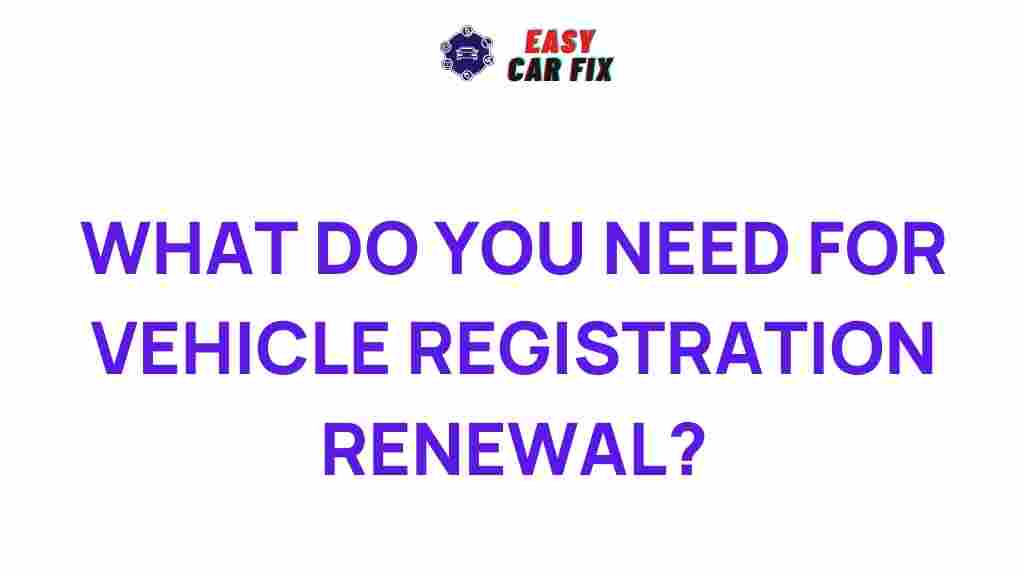Unveiling the Essential Requirements for Smooth Vehicle Registration Renewal
Vehicle registration is a crucial process that every vehicle owner must navigate to ensure their vehicle remains legal and roadworthy. The renewal of vehicle registration is often a straightforward task, yet it can become complicated without proper preparation. Understanding the necessary documents, the renewal process, and associated registration fees is vital for a hassle-free experience. In this article, we will guide you through everything you need to know about vehicle registration renewal, providing a detailed checklist to help you stay organized.
Understanding Vehicle Registration Renewal
Vehicle registration renewal is the process of updating your vehicle’s registration with your local Department of Motor Vehicles (DMV) or equivalent authority. This renewal typically occurs annually or biannually, depending on your state or country regulations. Failing to renew your vehicle registration on time can lead to fines, penalties, and even legal issues. Therefore, it’s essential to stay informed about the requirements and procedures involved.
Why is Vehicle Registration Renewal Important?
Renewing your vehicle registration is important for several reasons:
- Legal Compliance: It ensures that you are in compliance with local laws.
- Safety: Regular renewal often includes safety inspections that help ensure your vehicle is roadworthy.
- Avoiding Penalties: Timely renewal helps you avoid fines or penalties associated with expired registrations.
Essential Documents for Vehicle Registration Renewal
Before you start the vehicle registration renewal process, it’s crucial to gather all the necessary documents. Here’s a checklist of the essential documents you will typically need:
- Current Registration Certificate: Your existing vehicle registration document is required for renewal.
- Proof of Identity: A government-issued ID such as a driver’s license or passport.
- Proof of Insurance: A valid insurance policy or card that shows your vehicle is insured.
- Vehicle Title: If applicable, the title of the vehicle may be necessary to prove ownership.
- Payment Method: Prepare a method of payment for the registration fees, which can include cash, credit/debit card, or checks.
Step-by-Step Process for Vehicle Registration Renewal
The vehicle registration renewal process can vary by location, but generally follows these steps:
Step 1: Verify Renewal Eligibility
Check if your vehicle is eligible for renewal. This can often be done online through your local DMV website. Look for any outstanding issues such as unpaid fines or required inspections.
Step 2: Gather Required Documents
Using the checklist provided above, gather all necessary documents. Ensure that you have both physical copies and digital backups if possible.
Step 3: Complete the Renewal Application
Many states offer online renewal applications. Visit your local DMV website to fill out the application form. If you prefer to renew in-person, you can usually obtain a form at your local DMV office.
Step 4: Pay the Registration Fees
Registration fees vary by state and vehicle type. Be prepared to pay the required fees, which can also include late fees if you’re renewing after the expiration date. Check your local DMV for specific fee schedules.
Step 5: Submit Your Application
After completing your application and payment, submit your documents either online or at your local DMV office. Keep copies of everything you submit for your records.
Step 6: Receive Confirmation
Once your application is processed, you will receive confirmation of your renewal. This may be a physical sticker for your license plate, a new registration card, or both. Ensure that you keep these documents in your vehicle.
Common Troubleshooting Tips
Even with careful preparation, you might encounter issues during your vehicle registration renewal. Here are some common problems and how to resolve them:
- Missing Documents: If you find you’re missing a required document, check if you can obtain a duplicate online or contact the issuing agency for assistance.
- Payment Issues: If your payment fails, double-check your payment information and try again. Consider using a different payment method if issues persist.
- Expired Registration: If your registration has expired, you may be subject to late fees. It’s best to renew as soon as possible to minimize penalties.
- Online System Errors: If you encounter issues with the online renewal system, try clearing your browser cache or using a different browser. If problems continue, contact your local DMV for assistance.
Additional Resources
For more information on vehicle registration renewal, you can visit the DMV website, which provides state-specific guidelines and resources. Additionally, you can find useful tips on vehicle maintenance and safety checks that can help you prepare for the renewal process.
Conclusion
Renewing your vehicle registration doesn’t have to be a complicated process. By understanding the essential documents, following the step-by-step process, and being prepared for potential issues, you can ensure a smooth renewal experience. Remember to check your local regulations and keep track of your registration’s expiration date to avoid unnecessary complications. With this guide and checklist in hand, you’re well-equipped to tackle your vehicle registration renewal with confidence.
For further assistance, consider reaching out to your local DMV or checking their official website for the latest updates and information on registration fees and processes.
This article is in the category Basic Guides and created by EasyCarFix Team
